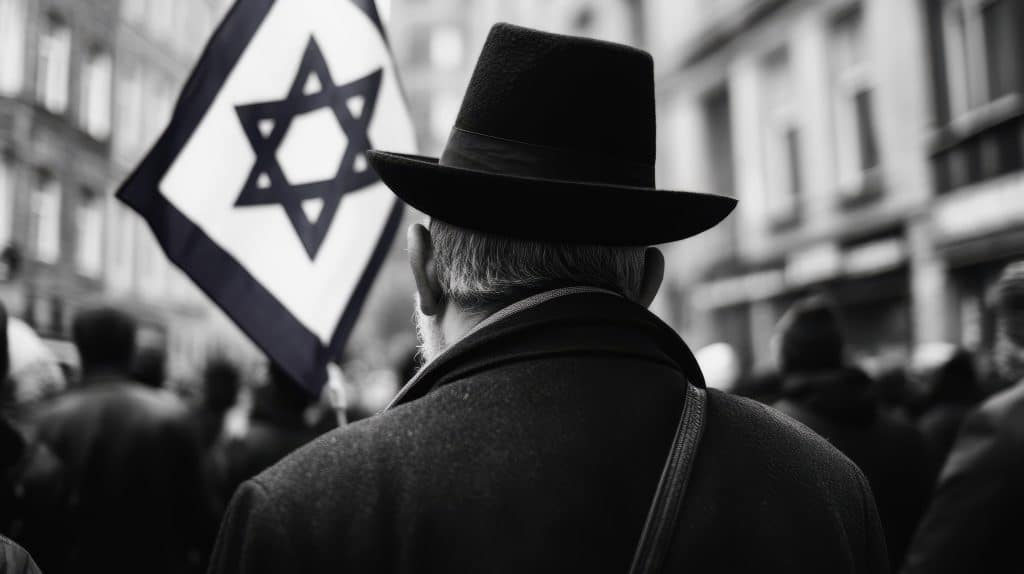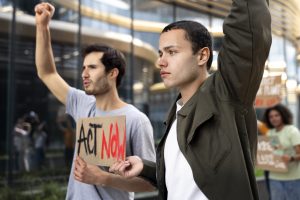Antisemitism in US politics: A rising concern

Anúncios

Antisemitism in US politics is becoming an increasingly prominent issue. The rise in hate speech, discriminatory policies, and harmful narratives online are making it necessary for leaders and activists to take swift action.
political discourse shifts, the need to address prejudice and promote tolerance has never been more urgent.
Anúncios
Let’s delve into the growing concern of antisemitism within the political sphere and its impact on society.
Historical context of antisemitism in the US
To fully understand the roots and evolution of antisemitism in US politics, we must look at the key historical events and social changes that have shaped the nation’s perception of Jewish communities.
From the early days of colonial America to today’s political climate, antisemitism in US politics has shifted and adapted, reflecting broader cultural, economic, and political trends.
Anúncios
Early Beginnings: Discrimination and Misunderstanding
In the early days of American colonialism, Jews faced significant prejudice, largely due to religious differences. As European settlers brought their longstanding biases with them, Jewish people were often marginalized and misunderstood.
These early misconceptions about Jewish culture and beliefs laid the foundation for centuries of discrimination.
However, the relationship between Jewish communities and broader society was not one-dimensional, and their experiences would evolve over time, deeply influencing antisemitism in US politics.
Key Milestones in the History of Antisemitism in the US
Several pivotal moments in history highlight the persistent presence of antisemitism in US politics, influencing its trajectory and impact on American society:
The Influx of Jewish Immigrants (Late 19th and Early 20th Centuries)
The late 1800s and early 1900s saw a large wave of Jewish immigration to the United States, driven by factors like religious persecution in Eastern Europe.
This influx of immigrants stirred existing prejudices and amplified negative stereotypes about Jewish communities, creating a fertile ground for antisemitism in US politics to grow.
The Rise of the Eugenics Movement (Early 20th Century)
During the early 1900s, the eugenics movement gained prominence, promoting ideas of racial purity and the superiority of certain groups.
Jews were often targeted by this movement, which sought to marginalize their identity and contributions to American society.
The movement influenced policy and attitudes toward marginalized groups, including Jewish people, further entrenching antisemitism in US politics.
World War II and the Holocaust
The impact of World War II and the Holocaust left a profound effect on global attitudes towards Jews.
On one hand, the horrors of the Holocaust led to increased sympathy for Jewish communities and efforts to provide refuge.
On the other hand, the war’s aftermath saw the emergence of new, more insidious forms of antisemitism in US politics, which found expression in subtle social and political spheres, even as public sympathy grew.
Antisemitism in Post-War America
Despite some progress in the aftermath of the Holocaust, antisemitism in US politics remained prevalent in the US throughout the mid-20th century.
The civil rights movements of the 1960s, which sought to address racial inequality, also intersected with the issue of Jewish identity.
However, some extremist groups co-opted civil rights rhetoric to further their own antisemitic agendas, complicating the social landscape and perpetuating harmful stereotypes about Jewish people.
Modern-Day Antisemitism: The Digital Age and Beyond
Today, antisemitism in US politics manifests in new and increasingly complex forms.
While overt hate speech may be less frequent, the rise of social media has made it easier for misinformation and antisemitic conspiracy theories to spread at alarming rates.
The anonymity and reach of these platforms allow prejudiced narratives to proliferate quickly, impacting public perception and contributing to a dangerous normalization of hate speech.
This antisemitism in US politics is often less overt, making it more difficult to address, yet it remains deeply ingrained in the national conversation.
In response, various communities across the nation are working to combat antisemitism in US politics by promoting education about Jewish history, fostering dialogue, and encouraging critical thinking, especially in schools and community centers.
These initiatives are crucial in helping to dismantle longstanding biases and create a more tolerant and informed society.
The Path Forward
While the history of antisemitism in US politics is complex, with moments of both progress and regression, the ongoing struggle to combat prejudice remains central to shaping a more inclusive society.
By examining these historical patterns, we can better understand the challenges that still exist and work towards a future where antisemitism in US politics is eradicated, and understanding and tolerance are prioritized.
Recent trends in political discourse
Recent trends in political discourse have marked a significant shift in how antisemitism in US politics is discussed and perceived.
Conversations about this issue, which were once more marginal, are now increasingly happening in public spaces, often amplified by social media.
The rise of digital platforms has given people the ability to share their thoughts and opinions widely, reshaping how political discussions unfold.
However, this shift has led to both positive and negative outcomes, particularly in the realm of antisemitism in US politics.
While the widespread sharing of ideas has raised awareness about antisemitism in US politics, it has also contributed to the normalization of harmful stereotypes.
These stereotypes can have real-world consequences, from influencing public opinion to shaping policy.
As antisemitism in US politics continues to manifest in new ways, it is essential to consider how digital spaces are influencing this dangerous trend.
Changing Narratives
The narratives surrounding antisemitism in US politics are evolving. More politicians are now openly discussing their stance against intolerance and hate, recognizing the damaging effects of antisemitism on American society.
This growing visibility of leaders taking a stand against antisemitism in US politics is encouraging communities to engage in open dialogues about prejudice and discrimination.
However, it is important to acknowledge how language shapes these discussions. The words and rhetoric used in political spaces can either exacerbate or reduce prejudice.
- Politicians are denouncing hate speech more frequently in public forums, signaling a shift in how antisemitism in US politics is being addressed.
- Social movements are pushing for more inclusive dialogue, advocating for a broader understanding of diversity and the importance of condemning antisemitism in US politics.
- Public figures are being held accountable for any antisemitic remarks, whether overt or veiled in euphemisms or conspiracy theories. This accountability is crucial to addressing the deep-rooted issues of antisemitism in US politics.
However, despite the growing condemnation of hate speech, some voices in politics continue to perpetuate antisemitic sentiments.
These expressions are often cloaked in euphemisms or conspiracy theories, making them more difficult to challenge.
This imbalance in how antisemitism in US politics is addressed creates a complicated and polarized discourse that needs to be confronted head-on.
Impact of Social Media
Social media plays a critical, double-edged role in shaping antisemitism in US politics. While it amplifies awareness of this issue by rapidly spreading information, it also enables harmful narratives to spread just as quickly.
The viral nature of social media makes it easier for antisemitic content to reach a broader audience, which can have significant implications for political discourse and public opinion.
Social media’s role in spreading misinformation about Jewish communities is undeniable, with dangerous stereotypes and conspiracy theories finding a large platform.
This can lead to misinformation, confusion, and resentment, exacerbating existing prejudices.
To combat this, many groups are working tirelessly to counteract the spread of antisemitism in US politics.
They promote educational campaigns that aim to inform the public about the dangers of antisemitism and encourage a more thoughtful, critical engagement with content shared online.
These initiatives seek to foster a better understanding of Jewish culture and history, challenging the harmful narratives that perpetuate antisemitism in US politics.
By encouraging people to think critically about the content they consume and share, these groups hope to shift the narrative toward a more informed and empathetic approach.
Through these efforts, the goal is not only to combat antisemitism in US politics but to ensure that political discourse becomes a platform for unity rather than division.
Impact of social media on antisemitism

The impact of social media on antisemitism cannot be understated. It plays a crucial role in shaping public opinions and spreading information rapidly.
While it can help raise awareness, it can also serve as a platform for spreading hate.
Social media platforms allow users to express their thoughts and feelings openly.
This freedom can lead to increased visibility of antisemitic views, often cloaked in persuasive language or memes. The viral nature of these platforms can amplify harmful messages faster than ever before.
Spread of Misinformation
Misinformation about Jewish communities often circulates widely, creating a distorted view of reality. This leads to dangerous stereotypes and misconceptions.
In many cases, antisemitic conspiracy theories can gain traction quickly, impacting societal beliefs.
- False narratives about Jewish wealth and control.
- Accusations linking Jews to global conflicts.
- Misinterpretations of Jewish customs and practices.
These harmful stereotypes can provoke negative sentiments, affecting how individuals perceive their Jewish neighbors. As these ideas spread, they can lead to a normalization of hate speech within political discussions.
Community Responses
In response to the rise of antisemitism online, many organizations are working to counteract the narrative. They encourage critical thinking and media literacy among users, helping them distinguish between facts and misinformation.
There are also initiatives focusing on reporting antisemitic content to keep online spaces safe.
Educational campaigns aim to enlighten users about antisemitism and its effects. By promoting understanding and empathy, these movements seek to reduce the prevalence of hate on social media.
Solidarity among different communities is vital in challenging the narratives that promote bias.
Case studies of antisemitic incidents
Examining case studies of antisemitic incidents helps us understand the different forms antisemitism takes and its impact on communities. These real-life examples illustrate the prevalence and seriousness of the issue.
One notable incident occurred in 2017, when a series of bomb threats were made against Jewish Community Centers across the United States.
This wave of threats caused widespread fear and prompted law enforcement to take action. The motives behind these threats often stemmed from extremist ideologies that seek to sow discord.
Highlighted Incidents
Some significant incidents include:
- The shooting at the Tree of Life synagogue in Pittsburgh, Pennsylvania, in 2018, where eleven lives were lost. This tragic event shocked the entire nation and highlighted the dangers of hate.
- The rise in various antisemitic protests that occurred during political campaigns, where hateful rhetoric often overshadowed meaningful dialogue.
- Recent vandalism of synagogues and Jewish cemeteries, where symbols of hatred were scrawled across sacred sites, further deepening community wounds.
These incidents are not isolated. They often reflect a larger pattern of antisemitism that permeates various aspects of society.
The normalization of hateful speech in media and politics can embolden individuals to act on these prejudices.
Community Responses
In the wake of these events, many communities have come together to stand against hate. Advocacy groups and local organizations organize vigils and educational campaigns to raise awareness about antisemitism and promote tolerance.
By sharing stories of resilience, they highlight the strength found in unity.
Effective community outreach can shift perspectives and challenge harmful beliefs. Encouraging open dialogues about these incidents allows society to confront antisemitism more openly.
Bringing awareness to the ongoing issue can help prevent future violence against Jewish individuals and communities.
Responses from political leaders
Responses from political leaders to antisemitism are crucial in shaping public opinion and tackling hate. When leaders speak out, they can influence societal norms and encourage collective action against discrimination.
In recent years, many political leaders have condemned antisemitic actions and rhetoric. This public denunciation serves to clarify that such behavior is unacceptable and must be addressed.
For instance, after the Pittsburgh synagogue shooting in 2018, numerous politicians expressed their condolences and called for unity against hate.
Notable Statements
Some key responses from political figures include:
- Statements from congressional leaders emphasizing the need for stronger laws against hate crimes.
- Public speeches addressing the importance of protecting Jewish communities from violence and harassment.
- Efforts to pass resolutions condemning antisemitism, promoting education and awareness.
These statements not only show solidarity with Jewish communities but also aim to raise awareness about the dangers of unchecked antisemitism.
However, the effectiveness of these responses can vary greatly. In some cases, leaders may only give symbolic statements without substantial follow-up actions.
The Role of Policies
Beyond statements, political leaders have a role in creating and enforcing policies that protect against antisemitism.
Legislative measures can help combat hate speech and support educational initiatives. Engaging with constituents about the importance of tolerance and respect can further strengthen these efforts.
Grassroots movements often emerge in response to political leadership, aiming to hold leaders accountable. Activists push for concrete actions rather than just words.
Their involvement is vital in sustaining pressure on political figures to address antisemitism seriously and continuously.
Grassroots movements against antisemitism

Grassroots movements against antisemitism play an essential role in combating hate and fostering understanding within communities.
These movements often arise from local residents who are passionate about standing up against discrimination.
One key feature of grassroots movements is their ability to mobilize people quickly. They use social media and community networks to raise awareness about antisemitism and organize events.
These initiatives can range from educational programs to public demonstrations.
Examples of Grassroots Efforts
Several grassroots movements have made significant impacts. Here are a few examples:
- Community vigils that honor victims of antisemitism help raise awareness and show solidarity.
- Workshops and seminars educate participants about Jewish culture and history, breaking down stereotypes.
- Campaigns that target schools promote inclusivity and encourage students to speak out against hate.
These actions help create a supportive environment where people can share their experiences and feelings. Grassroots efforts foster connections that can lead to long-lasting change.
Building Alliances
Grassroots movements often collaborate with other communities and organizations. Building alliances strengthens their impact and extends their reach.
By working together, they can amplify their message and contribute to a broader dialogue on tolerance and acceptance.
Coalitions between different groups can counteract antisemitic narratives effectively. They foster mutual understanding, creating an environment where hate cannot thrive.
In addition, these alliances allow for the sharing of resources and strategies to combat discrimination.
A Call for Unity and Action
The issue of antisemitism in US politics is an urgent matter that demands comprehensive action across all levels of society.
The rise of hate speech, misinformation, and discriminatory policies targeting Jewish communities highlights the need for both immediate and long-term strategies to combat prejudice and promote tolerance.
As antisemitism in US politics becomes more visible, it is clear that this is not just a political issue, it is a societal one that requires a united response.
Addressing antisemitism in US politics involves a multi-faceted approach. Political leaders must go beyond mere statements of condemnation and take concrete actions to legislate against hate.
Laws protecting Jewish communities from discrimination and violence must be strengthened, while efforts to educate the public about Jewish history and culture need to be expanded.
Additionally, antisemitism in US politics can be combated effectively through grassroots movements that empower local communities to engage in meaningful dialogue and challenge harmful narratives.
The digital age has made it easier for antisemitism in US politics to spread rapidly, particularly through social media.
This highlights the importance of fostering critical thinking and media literacy among the public, especially the younger generation.
By educating individuals on how to discern fact from fiction online, we can reduce the spread of harmful stereotypes and conspiracy theories that fuel antisemitism.
Ultimately, the fight against antisemitism in US politics is a fight for a society where all individuals are treated with dignity and respect, regardless of their background or beliefs.
By working together, politicians, activists, community leaders, and everyday citizens, we can build a more inclusive future that rejects hate in all its forms.
Let us stand united against antisemitism in US politics and ensure that we create a safer, more tolerant world for everyone.
To gain a deeper understanding of the issue, I encourage you to explore further through these insightful articles from Time and The Guardian.
These sources provide essential data and perspectives on the rising threat of antisemitism and its political implications.
In conclusion, the task is clear: we must all contribute to fighting antisemitism in US politics and ensure that the future is one where hate has no place to thrive.
FAQ – Frequently Asked Questions about Antisemitism in US Politics
What is antisemitism?
Antisemitism refers to prejudice or discrimination against Jews, encompassing a range of negative beliefs, attitudes, and actions.
How has social media impacted antisemitism?
Social media has amplified antisemitic messages, allowing misinformation to spread quickly while also providing a platform for grassroots activism against hate.
What role do political leaders play in addressing antisemitism?
Political leaders can condemn antisemitism publicly and support policies that protect against discrimination, influencing societal norms significantly.
How can grassroots movements combat antisemitism?
Grassroots movements raise awareness, educate communities, and mobilize individuals to take action against antisemitic incidents and promote tolerance.
Liked the article?





